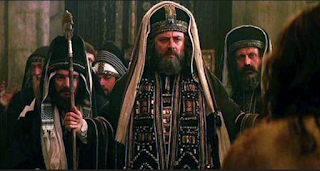[Previous: lines 113-132]
The priests and elders gather in the Temple, worried by Jesus's popularity.
Iamque sacerdotes, totaque ex urbe senatus------------
secretam in templi sedem concesserat omnis.
Ipse sacerdotum primus, cui tempora sacra [135]
infula cingebat, Caïphas in sede sedebat
celsior aurata; inde alii longo ordine cives:
quos omnes circumsiliunt, acuuntque furorem
tartareae, haud ulli visae, sine corpore pestes.
Nec mora, nec requies; sublapsae in pectora cunctis [140]
eripiunt mentem, atque animis incendia miscent.
Multa illi inter se vario sermone serebant
solliciti: vasto strepit ingens murmure templum.
Sunt qui ipsum iubeant utcunque absumere Christum,
seu vi sive dolo, iuvenemque invader ferro [145]
qui rursum in lucem nuper revocatus ab umbris
venerat, et totam monstro concusserat urbem.
Ast alii plebem metuunt, vulgique furorem:
namque sibi ingentes populos devinxerat heros,
hos meritis, illos divino affabilis ore. [150]
Now the priests and all the city’s leaders------------
met in the secret chambers of the temple.
The archpriest, his forehead adorned with a [135]
sacred chaplet—Caïaphas—sat on a raised
throne of gold; below stood a crowd of people
about whom danced, goading them all to fury,
hellish vermin, seen by none, incorporeal.
Without delay, never ceasing; into each heart [140]
flaming each mind and soul these devils worked.
The many talked anxiously amongst themselves
and the vast temple echoed with their murmur.
There were those who wanted to seize Christ by force,
or by stealth, and to kill the young man so [145]
recently brought out of death’s shadow to light,
the miracle still convulsing the whole city.
But others worried about sparking the crowd’s wrath:
for many had bound themselves to the hero
moved by his deeds and by his divine words. [150]
This short linking passage is based on John 11:54-57:
Jesus therefore walked no more openly among the Jews; but went thence unto a country near to the wilderness, into a city called Ephraim, and there continued with his disciples. And the Jews' passover was nigh at hand: and many went out of the country up to Jerusalem before the passover, to purify themselves. Then sought they for Jesus, and spake among themselves, as they stood in the temple, What think ye, that he will not come to the feast? Now both the chief priests and the Pharisees had given a commandment, that, if any man knew where he were, he should shew it, that they might take him.Vida also draws on John 12:10 ‘But the chief priests consulted that they might put Lazarus also to death.’ According to C H Dodd, John here ‘has provided a connecting passage’ between the raising of Lazarus (which occupies the first part of John 11) and Judas’s betrayal of Jesus at Passover. This, says Dodd, ‘is clearly designed to bring the report of the Council-meeting into the closest relation with the story of Lazarus … chapter xi constitutes a single and complete episode. Its theme is resurrection.’ [C H Dodd, The Interpretation of the Fourth Gospel (Cambridge 1953), 367-68].
[Next: lines 151-195]

No comments:
Post a Comment